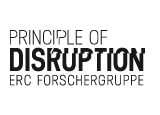Disruption is a phenomenon that has gained the attention of a broad and diverse range of academic disciplines: it has found a home as an object of study in mathematical information theory, philosophy, media and cultural studies, as well as in the history of ideas. The most fruitful research has made clear that disruptions are by no means solely destructive – they also have productive consequences.
The research group “The Principle of Disruption” seeks to build on this work by establishing disruption as a starting point for the analysis of formulas of societal self-description. On the one hand, the project is focused on the epistemological and aesthetic aspects of disturbances, which as moments of interruption or loss of order give rise to efforts aimed at the theoretical or practical consolidation of the social sphere. On the other hand, the project is interested in those powerfully repercussive narratives that construct political and socio-cultural coherence through the symbolic re-integration of imaginary or real disruptive incidents, such as terrorist attacks, rampage shootings, technical accidents and new forms of disease.
We assume that the cultural work of regulating social fears and fantasies is carried out in particular by fictional narratives. The products of literature, film and television prove to be crucial for the perception and processing of disruptions in a given society. An analysis of such fictions brings out the cultural scripts and plots in which one can discern the fear-laden scenarios of disruption that shape the outlook of Western societies on the past, the present and the future.
